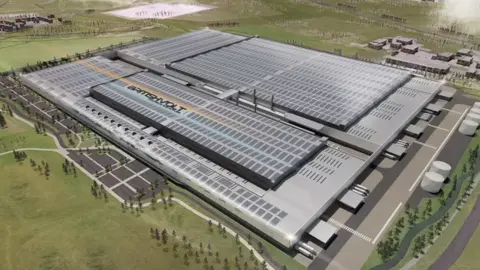UK battery firm staff agree to November pay cut
 Britishvolt
BritishvoltStaff at the UK battery firm Britishvolt have agreed to take a "significant" pay cut as the company battles to stay afloat.
The future of the start-up was thrown into doubt over fears it could run out of money after the government rejected a £30m advance in funding on Monday.
But the firm has raised enough money from an unnamed investor to keep going until early December.
To make the money go further around 300 staff will take a pay cut for November.
Executives at the firm will not take any pay at all for the month.
Britishvolt, which has been championed by the government, wants to build a factory in Blyth in Northumberland, which would build batteries for electric vehicles but has struggled to find investors.
The £3.8bn plant had been expected to create 3,000 jobs but has already been delayed several times, which has led to doubts over whether it will become a reality.
The government had committed £100m in total to Britishvolt for the project but when the firm on Monday wanted to draw down a third of the cash early, ministers refused.
The BBC understands that the firm had to meet set milestones, including attracting a certain level of funding from the private sector, to be able to access the government grant.
Since early September, the firm has had 26 meetings with government officials from the Department for Business, Energy and Industrial Strategy.
As first reported by the Financial Times, Britishvolt will now spend the next five weeks trying to find long-term funding. If it fails it will face the renewed prospect of bankruptcy before Christmas.
Britishvolt chairman Peter Rolton told the Financial Times he was "confident" the company would be able to raise the cash in time.
"We're nudging along, we are improving the position, but the interest is definitely there," he told the newspaper.
The FT said the sum raised on Tuesday was in the "single-digit" millions of pounds, according to sources, adding that Britishvolt previously said it needed to raise £200m to keep the business running until next summer.
'Exploring more funding streams'
In a statement, the company said it was exploring "both short and long-term funding streams" to build its so-called gigafactory, with several "international investors" making approaches in the past few days.
"While the weakening economic situation is negatively impacting much business investment at present, at Britishvolt we are continuing to pursue positive ongoing discussions with potential investors," the company added.
The project had been heralded by ministers as an example of "levelling up" - a Conservative aim of investing in communities to reduce economic imbalances in the country - with Blyth being one of Labour's seats to turn blue in the 2019 General Election.
At the time, then Prime Minister Boris Johnson hailed the investment as a "levelling up opportunity", while then Business Secretary Kwasi Kwarteng said the factory and the jobs it was forecast to create was "exactly what levelling up looks like".
The £100m government pledge to Britishvolt is aimed at helping to build its battery plant, as well as attracting more private investment for the development.
However, Britishvolt has been forced to delay the start of production at the plant several times, with the latest company announcement stating it would be delayed again until the middle of 2025.
